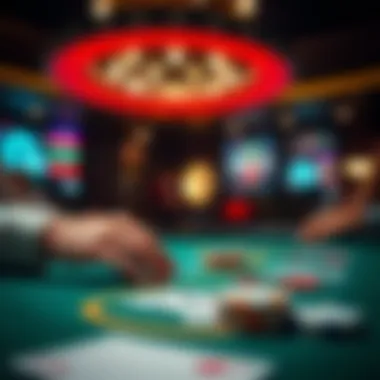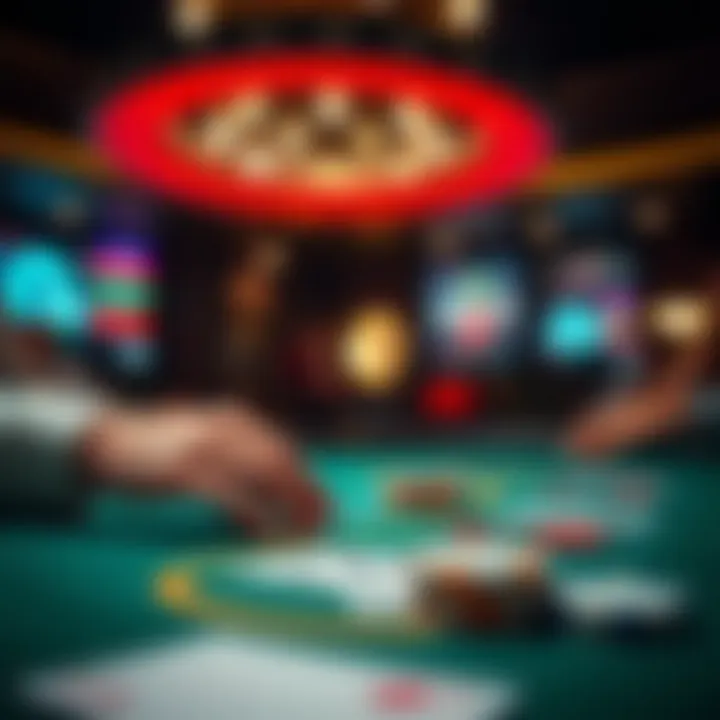Mastering Double Deck Blackjack Strategy for Success


Game Strategies
When you step onto the felt of a double deck blackjack table, you enter a realm where strategy can mean the difference between empty pockets and a full wallet. First off, let's grasp the essence of the game. Double deck blackjack uses only two decks of cards, which alters gameplay compared to single or multiple deck games. Fewer decks can tilt the odds slightly in the player's favor if they know how to properly manipulate basic strategy and advanced techniques.
Tips for Beginners
- Know the Basic Rules: Understand that the object of blackjack is to beat the dealer without going over 21. Familiarize yourself with terms like "hit," "stand," "double down," and "split."
- Stick to Simple Strategies: For beginners, sticking to basic strategy charts is crucial. These charts dictate the best actions based on your hand and the dealer's visible card. They are often available online or can be memorized as you progress.
- Avoid Insurance Bets: New players might be tempted by insurance when the dealer shows an Ace. It’s a bad bet in the long run, offering poor odds.
- Manage Your Bankroll: Decide in advance how much you’re willing to lose, and stick to that limit. The game's pace and excitement can sometimes lead players to chase losses, which is a slippery slope.
- Practice, Practice, Practice: Whether at home with friends or online at platforms like Reddit.com, familiarize yourself with the mechanics and rules without the financial stakes.
Advanced Techniques for Experts
As you progress into the higher levels of play, you’ll want to utilize more sophisticated tactics that can enhance your winning potential. Here are a few to consider:
- Card Counting: While it’s a controversial method and not without its risks, card counting can give you an edge by keeping track of the ratio of high cards to low cards left in the deck. This strategy involves assigning a value to every card that is dealt. For instance, cards 2 through 6 may carry a positive value while 10s and Aces are considered negative.
- Shuffle Tracking: This is a more advanced method where players try to track the group of high-value cards through the shuffle process. It requires sharp observation skills and a good memory, but it can pay off.
- Wonging: Named after Stanford Wong, this technique involves entering a game only when the count is in your favor and leaving when it's not. This is not always practical in live games but can be useful in certain scenarios.
- Playing Variations: Familiarize yourself with the variations of double deck blackjack, such as surrender options or the house rules regarding splitting Aces. Each variation may necessitate a slight adjustment to your strategy.
- Psychological Edge: Don't underestimate the mental game. Be aware of your body language and the cues your opponents might pick up on. Staying calm and collected can not only help your own decision-making but might also intimidate other players at the table.
"In blackjack, knowledge isn’t just power; it’s the difference between being a loser and a long-term winner."
Industry Insights
The landscape of gambling is continually evolving, and keeping an eye on industry trends can shape your approach to double deck blackjack.
Current Trends in Gambling
With more players flocking online, online casinos are introducing unique variations that blend traditional strategies with modern technology. Live dealer games are gaining popularity; they give players the thrill of a real casino experience from the comfort of home. Mobile gaming has also exploded, so make sure to look for apps or sites that offer a quality experience.
Responsible Gambling Practices
Gambling should always remain a form of entertainment, never a source of stress. Many casinos and online platforms now promote responsible gambling practices, which include:
- Setting Time Limits: Ensure you set a timer for your gambling session.
- Self-Exclusion Options: Many platforms allow you to voluntarily exclude yourself from playing after a specified period. This is a good practice for those who feel they might lose control.
- Seek Help if Needed: If gambling feels like more of an obligation than a pleasure, don't hesitate to reach out for help. Organizations such as Gamblers Anonymous can provide support.
Staying informed and smart about your jumping into double deck blackjack is key. This strategy, combined with a firm commitment to playing responsibly, will make your time at the tables all the more enjoyable and potentially profitable.
Prolusion to Double Deck Blackjack
In the realm of casino games, double deck blackjack stands out as a captivating variation of the classic game. This introduction serves as a gateway for gamblers and enthusiasts who seek to sharpen their skills and understanding of not just the standard game, but also its unique nuances.
Embracing double deck blackjack not only adds layers to your gameplay but also influences strategic decisions in a way that’s hard to ignore. The key here is recognizing why this variation offers players distinct advantages — particularly the reduced house edge if played correctly.
This article aims to bridge the knowledge gaps for players, creating a rich tapestry of insights that enhance their gameplay experience. With the dual decks at play, subtle shifts in strategy can often mean the difference between winning and losing.
Understanding the Game Structure
Double deck blackjack features gameplay that diverges from its single-deck cousin primarily due to its setup with just two decks. The number of cards in play can drastically alter betting strategies and risk management. It’s often said that in double deck blackjack, every card counts just a little more.
The game begins as both players and dealers receive two cards each; however, the dealer only shows one. This foundational structure adds an air of unpredictability. Paying attention to this situation allows players to gauge their initial odds and plan accordingly.
Players must make their decisions somewhere between instinct and strategy, which can be quite the balancing act. The fractions of a second spent assessing a situation can lead to a well-timed double down or split, potentially maximizing wins.
Variations from Standard Blackjack
Diving deeper into double deck blackjack, it’s essential to recognize how it diverges from the standard game. The most notable distinction lies in the rules governing the game. While rules can differ from casino to casino, generally speaking, players might find a more forgiving approach to hitting and standing. In some establishments, for instance, the dealer may hit on a soft 17 — a factor that significantly affects strategic decisions.
- Besides those rules, double deck games often carry unique payouts, which can either entice or deter players based on their knowledge of the odds.
- The fewer decks mean the probabilities of certain combinations of cards shift, influencing everything from card counting practices to betting strategies.
Understanding these variations is crucial. The better you comprehend how these rules reshape the gaming landscape, the more effectively you can adapt your tactics for success. Exploring this section will enable the reader to grasp crucial concepts for leveraging the nuances of double deck blackjack and possibly outsmarting their competition.
"In blackjack, as in life, it's all about the decisions you make based on the information at hand."
Arming oneself with the right knowledge can bring a player from casual to competitive in a short time. Whether you’re a novice or an experienced gambler, recognizing these undercurrents empowers you to take command at the table, ensuring that you aren’t just playing the game but mastering it.
As we move forward through this article, keep in mind the importance of each facet of double deck blackjack strategy. Players who consider the structure and variations comprehensively often find themselves on the winning side more often than not.
Rules of Double Deck Blackjack
Understanding the rules of double deck blackjack is fundamental to mastering the game. The rules create a framework that governs gameplay, offering players strategic choices while also setting limits and expectations. Unlike the single-deck or multi-deck varieties, double deck blackjack tends to have unique characteristics that can influence both the game flow and the strategic considerations you must adopt.
Dealer Rules
The dealer's rules are central to the rhythm of double deck blackjack. Usually, dealers must hit on a soft 17, making their play more aggressive, while some casinos might choose a rule where they stand. This distinction can significantly affect the player's strategy and risks. Having clarity on these rules lets players make informed decisions about their bets and actions.
When the dealer has to hit, they have a greater chance of busting. However, if they stand on a soft 17, it adds to the tension since players will need to be careful not to push their luck too far against a stronger hand. Understanding these nuances ensures that you can exploit the dealer's weaknesses.
"Knowledge of the dealer's rules is like having a map in an uncharted territory."
Player Actions
In double deck blackjack, the player actions encompass four critical choices that define the gameplay experience. Each action possesses specific implications for your overall strategy and can be adjusted based on both the cards in play and the dealer's upcard.
Hit
When you choose to hit, you're asking for an additional card in hopes of improving your total. This action is often seen as a tactical move during the game. One key characteristic of hitting is that it offers players the possibility to reach a favorable total, typically 21 or close to it.
Hitting is a beneficial option especially when you have a low total against a dealer's strong upcard. However, it’s a double-edged sword; the risk of busting looms large, which can lead to disappointment if the next card is higher than 21. This unique feature emphasizes both the thrill and danger inherent in blackjack, making it a vital aspect of gameplay.
Stand


Opting to stand means you're satisfied with your current hand, and you choose not to take any more cards. This action is pivotal when you believe your total is strong enough against the dealer's visible card. Standing can be a beneficial choice, especially when your total is 17 or higher, as the chances of busting increase with subsequent hits.
This decision requires a good grasp of probabilities; sticking to a strong hand can often yield better results than risking additional cards. The unique feature of standing lies in its ability to shield players from the prospect of a bust, while also presenting challenges when the dealer's hand is also strong.
Double Down
The double down clause permits you to double your bet after the first two cards are dealt, in exchange for committing to a single hit only. This tactic often shines when players have an initial total of 10 or 11, especially if the dealer's face-up card is weaker. The advantage of double down is clear: it amplifies potential winnings in favorable situations.
However, this move comes with a catch; you're doubling your risk, making it necessary to weigh the odds carefully. In practice, the unique feature of double down adds an element of excitement, allowing savvy players to capitalize on advantageous positions swiftly.
Split
When you have a pair, you can choose to split your cards into two separate hands, allowing you to play them independently. This action can be particularly advantageous when splitting aces or eights, maximizing your potential for a double win. The key characteristic of splitting lies in the enhanced chances of achieving strong hands, given that you can play out each individually.
On the flip side, however, this option can lead to increased risk, especially if the second split doesn't produce favorable outcomes. The strategic choice to split something has its moments of glory, but it requires deft judgment and confidence in one’s decision-making skills.
Fundamental Strategies
When it comes to the intricate dance of double deck blackjack, understanding fundamental strategies is akin to learning the ropes before engaging in the fray. It lays the foundation upon which players build their skills and knowledge. Fundamental strategies provide a logical framework that helps players make informed decisions during gameplay. These strategies are not just arbitrary rules; they are backed by mathematical probabilities and statistical analyses that can significantly enhance a player’s chances of success.
Often, players approaching double deck blackjack without a solid strategy are like soldiers heading into battle without armor. They may have good instincts, but without a strategic backbone, they expose themselves to unnecessary risks that could undermine their performance. Hence, grasping these strategies is vital not only for winning but also for cultivating a disciplined and educated gambling approach.
Basic Strategy Chart
A basic strategy chart serves as a vital roadmap for players navigating double deck blackjack. This chart outlines the optimal plays for every possible hand combination against the dealer’s up card. Here is a simple breakdown of the key decisions players encounter:
- Hit: When to take another card, often depending on the total of your hand and the dealer’s visible card.
- Stand: Knowing when to stick with your current total instead of risking another card.
- Double Down: An aggressive move, doubling your bet in exchange for committing to one more card only. Typically used when your cards total 9, 10, or 11.
- Split: Dividing pairs into two separate hands, a strategy that can amplify winning chances when executed correctly.
It’s important to note that this chart often varies depending on the specific rules of the casino, such as whether the dealer hits on a soft 17 or if doubling after splitting is permitted. Players should always adapt the charts to the house rules they are playing under.
Adjustments for Deck Composition
Adjusting for deck composition is a nuanced but crucial aspect of mastering double deck blackjack. The very nature of a double deck game implies that there are layers of complexity not found in single deck scenarios. As the cards are dealt and players begin to notice patterns, understanding which cards are still in play becomes instrumental.
- High Cards vs. Low Cards: If the remaining cards are rich in face cards and aces, players might adjust their strategy, playing with more aggressiveness since the odds favor the player.
- Deck Penetration: The depth to which the dealer goes into the shoe can influence strategy. If many cards have been dealt from the initial double deck, a player's perception of the card composition alters, warranting adjustments in their play.
Monitoring these factors requires a keen sense of observation and sometimes a notation strategy. As two decks are mixed, the potential outcomes are multiplied. Those that can successfully read these changes may refine their strategies accordingly, ultimately gaining an edge over the house.
"In blackjack, as in life, the ability to adapt to changing circumstances can make all the difference."
By combining these fundamental strategies, players equip themselves with the tools necessary to navigate the complexities of double deck blackjack effectively. Therefore, whether it’s following the basic strategy chart or making adjustments based on deck composition, having a well-defined approach can propel players toward more rewarding outcomes.
Advanced Strategies
In the quest to conquer double deck blackjack, leveraging Advanced Strategies is not just beneficial; it is indispensable. These strategies layer additional complexity onto the foundational tactics of the game, enabling players to gain an edge over the house. Understanding these advanced techniques is crucial for those looking to elevate their gameplay from mere participation to mastery.
One of the most critical elements of advanced strategies lies in the ability to adapt one’s approach based on the unique dynamics of each game. Players must be keen observers, noting shifts in the game’s tempo and their competitors’ behaviors. The benefits of implementing advanced strategies are twofold: they enhance the player's strategic depth and improve overall decision-making during high-stakes situations. The deeper insight into the game can lead to a more robust understanding of potential outcomes, thereby translating into more strategic bets and plays.
Card Counting Techniques
Card counting is perhaps the most well-known advanced strategy in the realm of blackjack. It functions on the premise that players can track the composition of high and low cards remaining in the deck. This information is crucial because it informs betting and playing decisions based on the likelihood of favorable cards being dealt.
To get started with card counting, one must follow some key points:
- Keep it simple: Many players prefer the Hi-Lo system. In this method, cards 2 through 6 are assigned a value of +1, cards 7 through 9 are neutral (0), and 10s, face cards, and aces are given a value of -1.
- Practice: Regular practice is essential. Use a deck of cards at home and train your brain to keep track of the counts quickly.
- Adjust your bets: As the count becomes more favorable, gradually increase your bets. This may sound simple, but executing it flawlessly in a casino setting requires discipline and practice.
"Card counting is not cheating; it's using the rules of the game to your advantage."
The significance of card counting in double deck blackjack cannot be overstated. Unlike single deck games, where the counts are more evident, the double deck format allows counting systems to be somewhat more challenging and nuanced. Therefore, adopting a consistent, systematic approach when applying card counting is critical for continual improvement and profit potential.
Bet Sizing Strategy
Bet sizing is another pivotal component in the advanced strategy toolkit. It involves adjusting the size of your bets based on the current context of the game — specifically, the deck composition and your current chip stack.
Here are some essential considerations when implementing a bet sizing strategy:
- Proportionality: As the count swings favorably, your bets should increase proportionately. A common method is betting 1% to 5% of your total bankroll when the count is neutral and scaling up as the conditions improve.
- Psychological Warfare: Understanding the mental aspect of betting is crucial. Large bets at advantageous counts can pressure opponents and may lead them to make errors.
- Table Selection: Look for tables with rules that favor the player. This can include options like surrender or tables that offer more favorable blackjack payouts. Adjust your bet to maximize your edge.
Utilizing a bet sizing strategy that flows logically from one's counting skills amplifies the benefits. The richness of this dual strategy—counting and sizing—allows gamblers to navigate the complexities of double deck blackjack with confidence.
Psychological Considerations
The realm of double deck blackjack extends far beyond the boundaries of mere numbers and strategies. Psychological considerations play a pivotal role in the game, affecting decisions and ultimately the outcome. Understanding how to harness the mind in this high-stakes environment can lead to significant advantages. It’s not just about counting cards or adhering to basic strategies; it also involves an awareness of the mental play at the table. Here, we will delve into specific elements that matter and the benefits they bring to seasoned players and newcomers alike.
Reading Opponents
A vital aspect of mastering double deck blackjack is the ability to read opponents. This skill, much like deciphering a poker face, requires acute observation and intuition. You need to pick up on subtle cues that might indicate their level of confidence or the strength of their hand. Here are a few things to watch for:
- Body Language: Are they relaxed, or fidgety? Calm players may have a strong hand, while nervousness might point towards uncertainty.
- Betting Patterns: Take note of how your opponents are wagering. A sudden increase in their bets could suggest confidence in their hand.
- Facial Expressions: Sometimes, a player’s face can be more telling than their cards.
The art of reading opponents goes hand in hand with psychology. Being mindful of their emotional state and how they respond to various situations can help you make educated guesses about their strategies. The smarter player not only increases their chances of profit but also reduces mistakes born from impulse. It's about taking mental notes for future rounds. The more you understand your opponents, the better chance you have at coming out ahead.
Managing Emotional Responses
In gambling, emotions can be akin to a double-edged sword. On one hand, they can fuel your excitement or desperation; on the other, they can distort your judgment. Managing emotional responses effectively is a skill that many overlook, yet it is crucial for consistent success in double deck blackjack. Here are some strategies to help maintain composure:
- Take Breaks: If you feel frustration creeping in, stepping away—even for a brief moment—can help clear the head.
- Set Limits: Establish both loss and gain limits before starting. Once you hit them, walk away.
- Breathe and Reset: Practice deep breathing techniques to stabilize your emotions. Calmness leads to clarity in decision-making.


"Emotional control can be more important than technical skill at the blackjack table. The right mindset can produce steady gains."
By mastering the ability to regulate your emotions, you grant yourself more control over how you play. This not only enhances the playing experience but also safeguards your bankroll. Understanding that both victory and defeat are a part of the game helps in maintaining a balanced perspective. Developing this mental resilience, especially in a double deck setup where the number of decks can shift the game's dynamic, is an invaluable asset.
In summary, psychological considerations are not merely auxiliary elements; they are the undercurrents steering your blackjack strategy. Reading opponents and managing emotional responses can significantly impact how effectively you play. As you embrace these notions, you’ll find that the intricate dance of double deck blackjack becomes less about chance and more a study of human behavior and decision-making.
Common Pitfalls in Double Deck Blackjack
Understanding the common pitfalls in double deck blackjack is essential for any player looking to hone their skills and improve their chances at winning. These missteps can result in significant losses or missed opportunities. By being aware of these traps, players can make better decisions that align with their strategies and enhance their overall enjoyment of the game.
Misinterpretation of Rules
In the realm of double deck blackjack, the first stumbling block often arises from a misinterpretation of rules.
It's critical to grasp the specific regulations that govern the game, as they can vary from one casino to another. For instance, many players assume that the dealer must stand on a soft 17. However, in certain establishments, the dealer may be permitted to hit in this situation, which directly affects the player's strategy. Understanding subtle differences like these can be the difference between a winning hand and a losing one.
Players should take the time to familiarize themselves with the house rules before sitting down to play. Here are a few common areas where players frequently misinterpret rules:
- Double down regulations: Some casinos only allow doubling down on specific totals, while others may have different thresholds.
- Splitting pairs: Knowing when and how often you can split pairs is crucial; some tables impose limitations.
- Insurance bets: It's essential to understand when taking insurance is advisable, as this side bet can often lead to losses over time.
"A player who knows the rules is a player who plays with confidence."
Overly Aggressive Play
Another major pitfall is overly aggressive play. In the heat of the moment, a player might feel emboldened by a winning streak and decide to raise their bets significantly, thinking luck is firmly on their side. However, this bravado can often lead to an abrupt downturn in luck.
Many players start to believe they can wing it or that they know better than the basic strategies that have been proven over time. This kind of mindset can lead to all sorts of issues. For example, increasing bets without adjusting strategy can quickly drain one's bankroll.
Instead of diving headfirst into reckless wagering, consider these points to avoid overly aggressive play:
- Stick to your strategy: Make sure you're playing according to your established tactics, especially during losing streaks.
- Establish a budget: Set limits on how much you're willing to bet before the game starts. Adhering to this budget helps prevent chasing losses.
- Know when to walk away: Recognizing when it's time to leave the table can save you from diminishing returns.
Deck Penetration and Its Importance
In the world of Double Deck Blackjack, there exists a silent force that can drastically shift the odds in favor of the player. It’s not always a flash of genius at the card table or a stroke of luck on the draw; rather, it’s the concept of deck penetration. Understanding deck penetration can deepen your grasp of the game and enhance your strategic approach.
Deck penetration refers to how deeply into the shoe or stack of cards the dealer will go before reshuffling. In games with greater deck penetration, players have the ability to capitalize on their knowledge of card counting and other strategies. The basic idea is clear: the deeper the dealer penetrates into the deck, the more accurate your predictions about the remaining cards become. Given that a double deck game has a total of 104 cards, optimal penetration might see you able to play through 60-80% of the deck before it’s reshuffled. The strategic advantage is palpable here.
With higher deck penetration, the likelihood of card values that were previously counted becoming available for play increases significantly. This opens the door to more informed decisions on your part. It’s not just about when to hit or stand; it gives you the tools to adjust your betting strategy, potentially increasing your bankroll over time. Moreover, if you’ve mastered techniques like card counting, achieving deeper penetration can significantly enhance your opportunities to place smart, calculated bets.
“In Blackjack, information is power. The deeper the penetration, the more information you have.”
One must also contemplate the practical side of things. Not every casino allows for deep penetration, as it’s a double-edged sword. From a house perspective, minimal penetration helps protect their advantage. Thus, knowing which casinos embrace favorable conditions can be a game changer in your strategy. Overall, understanding the dynamics of deck penetration not only enhances gameplay but also fosters a keen awareness of the strategic landscape.
Understanding Deck Penetration
When examining deck penetration, you'll often hear it discussed alongside its implications for the player’s strategies. As mentioned earlier, it denotes how much of the deck is used before a shuffle occurs, which can substantially impact your betting patterns and game tactics. But how do you measure it?
To start, deck penetration is usually expressed as a percentage. For instance, if a dealer goes through 75 of the 104 cards before reshuffling, that’s 72% penetration. This number is paramount for the skilled player, as it defines just how much of the remaining shoe they can predict. If allowed to fully extend your strategy during a high penetration situation, you can make more accurate decisions on whether to hit, stand, double down, or split.
Also, it’s wise to recognize that varying penetration levels can be observed across different casinos. Some venues may have strict rules in place that result in shallower penetration to protect the house edge, while others—perhaps those looking to attract players—might allow deeper penetrations, giving you a better shot at adjusting your play accordingly. It’s a bet within the bet, and knowing your gaming environment plays a vital role in successful gameplay.
Optimal Strategies for Various Penetration Levels
As a savvy player, understanding how to adjust your strategy based on the level of deck penetration is crucial. The strategies can differ significantly based on how much of the deck remains in play.
- High Penetration (75% or more): In situations with high penetration, you may want to ramp up your aggressive strategies—particularly if you've employed card counting methods. The wealth of information available could lead you to adjust your bets upward, especially when the remaining cards favor your position. The return on investment (ROI) can be substantially beneficial here.
- Moderate Penetration (50%-74%): At this level, it’s about playing it smart. Maintain a balanced approach. You can still leverage your knowledge without getting overzealous. Here, minor adjustments to your bet sizes or tactical choices, based on your counts, can shift your gameplay just enough to gain an advantage without overextending yourself.
- Low Penetration (below 50%): If you find yourself in a game where the penetration is minimal, it may warrant a reassessment of your engagement. This situation doesn’t necessarily mean abandoning the table, but it does suggest you should play more conservatively. It’s often more advantageous to just adhere to basic strategy and minimize risks while waiting for better conditions.
Impact of House Rules
When it comes to double deck blackjack, the influence of house rules cannot be overstated. House rules pertain to the specific regulations and gameplay variations that a casino employs. These can significantly affect your strategy, expected payouts, and overall approach to the game.
Variations Across Casinos
Every casino has its own set of house rules which can range from minor tweaks to major gameplay changes. Here are some common variations you might encounter:
- Dealer Stands or Hits on Soft 17: In some places, dealers must hit on a soft 17 (an Ace plus a 6), while in others they must stand. This difference can change your strategy significantly. If the dealer stands, it reduces the house edge, making your odds slightly better.
- Double Down Rules: Some casinos allow doubling down on any two cards, whereas others restrict it to certain hands. For instance, the ability to double down after splitting can be a significant advantage.
- Blackjack Payouts: Standard payout for a blackjack is 3:2, but some casinos offer 6:5. This seemingly small adjustment has a considerable impact on the house edge. Players should be wary of this when placing bets.
- Surrender Options: Not all casinos allow players to surrender, where you can fold your hand and forfeit half your bet. This can be an essential option for smart players looking to minimize losses.
Understanding these variations can save players grief down the road, as not every casino will be generous with their rules. Keep your eyes peeled and your wits about you.
Adjusting Strategy Based on House Rules
Once you've identified the house rules at your preferred establishment, the next step is to tailor your strategy accordingly. Adapting to these rules can greatly enhance your odds of winning. Below are some strategies that may help:
- Revising Basic Strategy: If you know the dealer will hit on soft 17, it is generally wise to adjust your strategy slightly. For example, if you have a hand of 12 against a dealer's 2, the best option may change according to their hitting behavior.
- Taking Advantage of Doubling Down: If a casino allows doubling on any two cards, look for opportunities to make aggressive plays when your hand is strong. Use this to maximize your potential winnings on favorable hands.
- Calculating Risk Based on Payouts: If you’re playing at a casino that offers 6:5 payouts for a blackjack, consider the risk before placing large bets. It may be more prudent to play conservatively in such settings.
- Utilizing Surrender Wisely: If allowed, don’t hesitate to surrender when favorable. This can save you from losing larger amounts compared to sticking it out with weaker hands.
As with any aspect of gambling, leveraging these house rules effectively will require practice and observation. Remember, the house always has an edge, but understanding the rules can tilt the odds slightly in your favor.
"Every player must know the rules before playing; ignorance is not bliss in the world of betting."
By understanding and adjusting your strategy based on the unique house rules you encounter, you're not just playing a game; you're navigating a complex landscape of decisions that can lead to winning or losing. Take time to learn the nuances and find ways to make them work for your gameplay.
Utilizing Technology and Tools
In the modern world, technology plays a pivotal role in refining strategies and honing skills, especially in games like double deck blackjack. Utilizing various technologies and tools can significantly enhance a player's understanding and execution of strategies. Gamblers, casino enthusiasts, and even casual players can benefit from a range of software applications and online resources that help decode the complexities of the game. The key is knowing where to look and how to leverage these resources effectively.
Software for Strategy Development


When it comes to strategy development, specialized software can be a game changer. Several programs are designed specifically for analyzing blackjack strategies, including those tailored for double deck settings. These applications often come packed with features that allow players to simulate different gaming scenarios, optimize their betting strategies, and improve their overall gameplay.
Some notable software solutions include:
- Blackjack Simulator: This type of software lets users run simulated games based on different strategies and variations. Players can see how specific moves affect their odds, helping to inform decision-making in real-life games.
- Blackjack Card Counter: Tools that assist players in tracking cards can provide significant advantages. These apps can help ascertain the composition of remaining cards, giving players a clearer edge when deciding to hit, stand, double down, or split.
- Practice Tools: Many software applications offer tutorials and practice modes. These are crucial for newcomers trying to grasp basic strategies or for seasoned players looking to brush up on advanced tactics through consistent practice.
In using these tools, it’s wise to take time to familiarize oneself with their interfaces and functionalities to make the most of their potential benefits.
Online Resources and Forums
Another invaluable aspect of mastering double deck blackjack is tapping into the wealth of online resources and forums. The digital age has given rise to communities dedicated to discussing strategies, sharing insights, and providing support in the gambling journey. Websites and forums such as Reddit’s /r/blackjack or specialized gambling sites host a plethora of information that covers everything from basic rules to advanced psychological tactics.
Key benefits of engaging with these platforms include:
- Community Support: Engaging with fellow players can provide emotional support and motivation. Interaction with like-minded individuals often leads to the sharing of tips and tricks that one might not find in traditional literature.
- Real-Life Experience Sharing: Online forums allow for the exchange of first-hand experiences, helping players learn from the successes and mistakes of others. This can expedite the learning process and prevent common pitfalls.
- Access to Updated Strategies: The world of gambling is always evolving, and so are the strategies. Keeping up with forums enables players to stay informed about the latest trends, techniques, and changes in rules across different casinos.
To leverage these resources effectively, engage actively, ask questions, and don’t shy away from sharing your insights as well. It creates a cycle of knowledge that benefits everyone in the community.
"The beauty of technology is that it levels the playing field; everyone has the chance to learn, adapt, and improve."
Whether one relies on software for strategic refinement or interacts in forums to glean wisdom from others, embracing technology in double deck blackjack is not just beneficial; it’s essential for those serious about mastering the game.
Building a Winning Mindset
Building a winning mindset is a key ingredient in the recipe for success in double deck blackjack. It goes beyond just knowing the rules or perfecting your strategy; it involves a thoughtful approach to the mental aspects of the game. When gamblers cultivate a strong mindset, they enhance their ability to make calculated decisions, manage emotions, and ultimately improve their performance at the table.
The importance of a winning mindset can be illustrated through several facets:
- Mental Resilience: Blackjack is often a game in which swings in fortune are the order of the day. By developing resilience, players can better cope with losses and stay focused on their strategies. When unfavorable outcomes arise, a resilient mindset helps to avoid emotional decision-making, which can lead to further losses.
- Focus and Concentration: Maintaining concentration in the fast-paced environment of a casino can be a challenge. A winning mindset requires sustained focus and an ability to block distractions. It’s vital to stay engaged with the game, track the cards, and observe how other players behave. This attentiveness can uncover valuable insights to refine your strategies.
- Emotional Control: The psychological thrill of gambling can lead to euphoric highs and crushing lows. Rather than becoming overjoyed with wins or despondent with losses, a sound mindset equips players with the capacity to manage their emotions effectively. Emotion-driven play can be detrimental, often leading to impulsive actions that stray from a player's strategy.
Embracing Discipline
Discipline in double deck blackjack is essentially the backbone of a successful gambling experience. To excel, it's crucial to stick to established strategies and avoid getting swept away by impulses or trends. Here are several points worth considering about discipline:
- Adherence to Strategy: Whether it's basic strategy or advanced tactics, a disciplined player always aligns their actions with their premeditated strategies. This approach minimizes the effect of emotional influences and maximizes the chances of success.
- Bankroll Management: Good discipline extends to managing one's bankroll. Setting limits on how much to wager and knowing when to walk away can prevent financial pitfalls. It requires resisting the urge to chase losses, which can lead players down a devastating spiral.
- Practice Regularly: Regular reinforcement of strategies in a controlled environment, such as simulators or online games, can sharpen skills and instill discipline. Moreover, practicing under pressure, like in real game scenarios, can help solidify mental habits.
Setting Realistic Goals
Setting realistic goals is integral to a winning mindset and plays a significant role in player success at the blackjack table. Goals help in creating structured pathways to success and encourage accountability. Failing to set clear, attainable targets can lead to frustration and burnout. Consider these strategies when establishing goals:
- Short-term vs Long-term Goals: Differentiate between what can be achieved in the short run versus long-term aspirations. While short-term goals might include winning a certain amount in a session, long-term goals may refer to a player's overall improvement in skill.
- Measurable Objectives: Goals should be specific and measurable. Instead of loosely stating, "I want to win more often," it could translate to, "I want to increase my win rate by 5% over the next 50 sessions." Specificity brings a clear direction.
- Flexibility in Goals: Understand that the unpredictable nature of gambling can necessitate adjustments in goals. If changes in rules or game conditions occur, be prepared to reassess and recalibrate your targets, ensuring they remain realistic and relevant.
"A focused player with purpose-driven goals tends to outshine those who play by the seat of their pants."
Feedback and Continuous Learning
In the realm of double deck blackjack, the journey to mastery isn't a straight path. It twists and turns, requiring players to hone their skills consistently through feedback and continuous learning. Knowing the rules and strategies is just the start. Real improvement occurs when players actively engage in reflection and seek out learning opportunities.
Analyzing Gameplay
One of the most effective ways to refine your double deck blackjack skills is to analyze your gameplay after each session. This process involves breaking down your decisions during the game—what worked, what didn't, and why. For example, if you consistently lost hands when doubling down, it might be worth reviewing your decision-making process.
Consider keeping a gameplay journal where you can note specific situations, including your initial hands, the dealer's face-up card, and any alterations in your strategy. Taking note of these details can provide valuable insights into patterns in your play. By doing this, you may notice that perhaps you're too conservative in certain situations, or maybe you’re missing opportunities to capitalize on a favorable deck composition.
Key Elements to Analyze:
- Initial Hand Choices: Were your starting decisions optimal based on the strategy chart?
- Response to Dealer's Up Card: How did you adapt your play according to the dealer's strengths?
- Betting Patterns: Did your bet sizing reflect the level of risk based on current deck penetration?
Through thorough analysis, you cultivate a deeper understanding of the nuances of the game, allowing you to adjust your strategies to improve future outcomes.
Seeking Experienced Players’ Insights
Gleaning insights from seasoned players can significantly boost your learning curve. Experienced blackjack players have likely gone through their own maturing process in the game. Learning their strategies, mistakes, and successes offers a unique perspective that textbooks can’t provide.
Consider joining online forums or local gaming clubs where players share their experiences and tactics. Engaging in discussions can open doors to new approaches or strategies you may not have considered. Also, observing others play can reveal subtleties in betting and psychological tactics that you might be able to incorporate into your own gameplay.
Ways to Connect with Experienced Players:
- Online Platforms: Websites like reddit.com provide spaces where you can ask questions and gain perspective from a range of players.
- Local Casino Meetups: Find regional groups where players gather to share tactics in a social setting, making learning both productive and enjoyable.
- Tutorials and Videos: Platforms like YouTube host numerous tutorials from experienced players that cover various strategies and insights.
A common proverb in poker and blackjack circles is, “You can’t teach an old dog new tricks,” but actively seeking input from others can prove them wrong. By blending your introspective analysis with the wisdom of seasoned players, you not only enhance your understanding of the game but also build a community that supports long-term growth in your blackjack journey.
As you embrace feedback and pursue continuous learning, the progress you make in double deck blackjack can lead to notable improvements, enriching your gameplay and perhaps even filling your pockets with some well-earned winnings.
Ending
In the captivating world of double deck blackjack, honing mastery is not just a matter of luck; rather, it hinges on a well-structured understanding of strategies, rules, and psychological factors involved in the game. As discussed throughout this article, knowledge is your strongest ally when facing the felt. The tip of the iceberg includes mastering fundamental strategies—from basic rules to advanced techniques like card counting. Failure to understand these principles can lead many to make costly mistakes, diminishing their enjoyment and potential success.
The intricate dance of player and dealer unfolds with each round, demanding astute awareness and adaptability to changing circumstances. By grasping the idiosyncrasies of double deck play—like the influence of house rules, optimal deck penetration, and various player actions—you empower yourself to make informed decisions, much like a chess player anticipating the opponent's next move. Additionally, the psychological dimension cannot be understated; being attuned to your emotions and those of your fellow players can sway outcomes significantly.
Ultimately, mastering double deck blackjack is not just an exercise in agility and strategy; it is an ongoing journey. The more you practice and reflect on your gameplay, the closer you inch towards proficiency. Remember, every round is an opportunity to learn, adapt, and refine your approach to maximize your potential for victory. Your journey is uniquely yours; embrace it.
Summary of Key Points
- Comprehension of Rules: Understanding the specific rules of double deck blackjack is fundamental. This encompasses knowing when the dealer hits or stands, as well as how splitting and doubling down function within this variant.
- Strategic Depth: Familiarize yourself with basic and advanced strategies. Effective gameplay requires not just a memorization of strategies, but an adaptability to various scenarios and deck compositions.
- Psychological Awareness: Recognizing emotional influences on your play and gauging your opponents' psychological states can provide significant advantages.
- Continuous Learning: The landscape of blackjack is ever-evolving, and staying updated through gameplay analysis and insights from other experienced players will enhance your strategic play.
Encouragement for Practice and Development
Perfection does not occur overnight. It takes time, patience, and rigorous practice to truly master double deck blackjack. Here are some ways to enhance your skills:
- Play Regularly: Engage in consistent practice, whether at physical casinos or online platforms. Real-world experience sharpens instinctive reactions.
- Utilize Simulation Software: Tools and software can offer a risk-free environment for you to test strategies and refine your approach.
- Seek Feedback: Engage with seasoned players in forums like Reddit or approach local game clubs.
- Set Incremental Goals: Clearly defined objectives offer motivation. For instance, aim to gradually enhance your betting strategy or improve your deck counting accuracy.
- Reflect on Each Session: After each gaming session, take time to analyze your plays, decisions and outcomes. What worked? What didn't? This reflective practice is crucial for growth.
Embarking on the journey to master double deck blackjack is fulfilling. Not only does it test your analytical skills, but also your ability to adapt, strategize, and connect with others. Dive deep into the nuances of this enthralling game, and with each hand played, you will find yourself inching closer to expertise.















